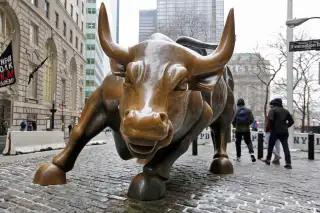"A Rougher Road": 5 Investing Pros Predict Where the Stock Market Is Headed in 2019

The stock market's bull run – born all the way back in March 2009 – became the longest on record last year. But, with the U.S. economy facing rising interest rates and a trade dispute with China, things got decidedly rocky in the final months of 2018, with the S&P 500 tumbling more than 10%. Can the bull regain it's charge – and reach it's 10th birthday in March?
We asked five market pros what they think:
"Bull Markets Don't Die of Old Age"
Saira Malik, managing director and head of global equities at Nuveen
"The bull market will continue as long as earnings growth remains steady. Bull markets don't die of old age. The most likely reason for this one to end is inflation and higher interest rates – and we're not really seeing that yet. The bull market will look a lot different, however: It's going to be a late-cycle market, with continuing nervousness and volatility. U.S. growth won't be as strong as last year, as the boost from tax cuts slows down."
"A Rougher Road"
Kate Warne, principal and investment strategist at Edward Jones
"Yes, although it'll be a rougher road than in the last few years. Stocks continue to be well positioned both domestically and globally, but we'll see more volatility. Investors will likely swing back and forth from worrying about inflation – which we'll see occasional signs of – to worrying about slowing earnings and GDP growth. The rest of the world is clearly lagging, especially in China and Europe, which will dampen U.S. growth and lead to still more uncertainty. While the impact of tax cuts and increased government spending will fade, calls for a recession seem premature. Consumers remain optimistic, and job growth is stronger than many people would have predicted."
"Not Immediately Bearish"
Nicholas Sargen, senior vice president, chief economist, and senior investment advisor at Fort Washington Investment Advisors
"I think the bull market will continue for at least part of 2019, but I certainly don't believe the Fed's optimistic forecast for the next three years is accurate. The market is mildly overvalued, but it's not in a bubble. I'm not immediately bearish, since earnings reports are still fairly robust, which should give the bull market momentum into the first half of the year. After that, I see a natural slowdown of the U.S. economy, and depending on how the trade picture plays out, we could have a spillover: Overseas economies hurt by tariffs will slow first, and then, eventually, that weakness will reverberate back and hit the U.S."
Low Volatility "Isn't Likely to Continue"
Matthew McLennan, head of global value team and portfolio manager at First Eagle Investment Management
"The main risks for 2019 are increasing global political tensions, many nations' high debt levels, and the fact that in some markets, stock prices are high relative to corporate profits. Last year was a good one for the U.S. economy, as tax cuts and deregulation gave earnings an extra pop. But the below-normal volatility that U.S. stock and bond markets have enjoyed over the past several years, thanks in part to the Fed's bond-buying program, isn't likely to continue."
"In the Midst of a Transition"
Mohamed El-Erian, chief economic advisor at Allianz
"We are in the midst of a transition from a liquidity driven market – where central banks have been injecting money into the market – to a fundamentally driven market. The transition will be a good thing in the long run, but the process is inherently turbulent. So I see the bull market being a lot more volatile. As to whether it continues, that will depend on other countries catching up to U.S. growth, since there's been a large gap in performance across the industrial world – with the U.S. outpacing everybody else. I'm less concerned about calls for recession here because we have three U.S. economic engines kicking into higher gear at the same time: government spending, consumption driven by higher household income, and greater business investment. That should carry us for two to three more years in terms of solid growth."